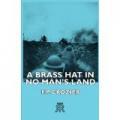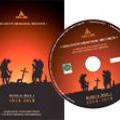the war to end all wars
Published on 1st September 2014
 As you’re probably aware, last year we entered what’s being called the decade of commemoration. It began with the centenary of the lockout, and continues now with the onset of World War One. This war was such a catalyst: The world was a completely different place at the end of those four years than it had been at the start of them; and the sheer bad luck of that generation, finding themselves plunged into a maelstrom, is heartbreaking. The centenary brings a surfeit of material, and with it a danger of overkill, but that will pass, and the commemorative material and research will be invaluable down the line. In the meantime, here is a sample of both fiction and non-fiction looking at the war from different viewpoints.
As you’re probably aware, last year we entered what’s being called the decade of commemoration. It began with the centenary of the lockout, and continues now with the onset of World War One. This war was such a catalyst: The world was a completely different place at the end of those four years than it had been at the start of them; and the sheer bad luck of that generation, finding themselves plunged into a maelstrom, is heartbreaking. The centenary brings a surfeit of material, and with it a danger of overkill, but that will pass, and the commemorative material and research will be invaluable down the line. In the meantime, here is a sample of both fiction and non-fiction looking at the war from different viewpoints.
ALL QUIET ON THE WESTERN FRONT
 The German viewpoint. One of the earliest, and best, novels written about the war, and from the perspective of a German soldier, who has joined up straight out of school with his classmates: ‘We were eighteen and had begun to love life and the world; and we had to shoot it to pieces’. The regular German soldier suffered just as much at the hand of fate as their counterparts, dealing with mismanagement, poor equipment, hunger, rats, slaughter, and yearning for a normal life: on one of their regular forays to the front they pass a mass of new coffins, ready and waiting for them. Remarque also wrote a sequel called The Road Back, which continues the story of the surviving characters, and describes their rehabilitation into a corrupt and uncaring society.
The German viewpoint. One of the earliest, and best, novels written about the war, and from the perspective of a German soldier, who has joined up straight out of school with his classmates: ‘We were eighteen and had begun to love life and the world; and we had to shoot it to pieces’. The regular German soldier suffered just as much at the hand of fate as their counterparts, dealing with mismanagement, poor equipment, hunger, rats, slaughter, and yearning for a normal life: on one of their regular forays to the front they pass a mass of new coffins, ready and waiting for them. Remarque also wrote a sequel called The Road Back, which continues the story of the surviving characters, and describes their rehabilitation into a corrupt and uncaring society.
A COWARD IF I RETURN, A HERO IF I FALL
 The Irish viewpoint. Up until very recently, Ireland denied its role in the war: the Easter Rising executions and subsequent rise in nationalism changed the public’s view of the Irish Fusiliers from heroes to traitors; and men and boys who had joined up for a variety of reasons – financial, a sense of duty, a belief that it would further Home Rule, or purely for adventure – returned to find themselves booed and shunned by society, unemployable, and erased from their family history. Now, with a century’s distance, this view is changing, and this book commemorates through diaries and interviews with family members the significant and substantial role of Irishmen. The book admirably refuses to glorify, just to acknowledge.
The Irish viewpoint. Up until very recently, Ireland denied its role in the war: the Easter Rising executions and subsequent rise in nationalism changed the public’s view of the Irish Fusiliers from heroes to traitors; and men and boys who had joined up for a variety of reasons – financial, a sense of duty, a belief that it would further Home Rule, or purely for adventure – returned to find themselves booed and shunned by society, unemployable, and erased from their family history. Now, with a century’s distance, this view is changing, and this book commemorates through diaries and interviews with family members the significant and substantial role of Irishmen. The book admirably refuses to glorify, just to acknowledge.
 A nurse’s viewpoint. The diary of Dorothea Crewdson, a volunteer nurse in France from 1915 to 1919, preparing wounded soldiers to get back to England to convalesce. A typical nurse, she is practical and unfazed in the face of horrific injuries, shellshock, and bombs, and continues nursing the wounded well into 1919. Lots of interesting little details, including Fords, flappers (in 1916!), and how messenger dogs were showered with (harmless) bombs while being fed to accustom them to the noise. The diary includes Dorothea’s very vibrant little line sketches.
A nurse’s viewpoint. The diary of Dorothea Crewdson, a volunteer nurse in France from 1915 to 1919, preparing wounded soldiers to get back to England to convalesce. A typical nurse, she is practical and unfazed in the face of horrific injuries, shellshock, and bombs, and continues nursing the wounded well into 1919. Lots of interesting little details, including Fords, flappers (in 1916!), and how messenger dogs were showered with (harmless) bombs while being fed to accustom them to the noise. The diary includes Dorothea’s very vibrant little line sketches.
 The old soldier’s viewpoint. The memoir of a Northern Irish Protestant with a military background, who joins the Royal Irish Fusiliers in Dublin. Crozier describes how the men thrown together from both sides of the Irish divide found it difficult to free themselves from their insular and parochial mindsets, and to work together as a team. This book makes uncomfortable reading: it’s pretty graphic and Crozier freely admits in his memoir that his job was to provide cannon fodder; that said, he states that it’s far better for humanity to eradicate war itself than to pretend it can be undertaken without brutality. The voice and tone are very much of their time, but then this is what helps us develop a deeper understanding of a world we find difficult to relate to.
The old soldier’s viewpoint. The memoir of a Northern Irish Protestant with a military background, who joins the Royal Irish Fusiliers in Dublin. Crozier describes how the men thrown together from both sides of the Irish divide found it difficult to free themselves from their insular and parochial mindsets, and to work together as a team. This book makes uncomfortable reading: it’s pretty graphic and Crozier freely admits in his memoir that his job was to provide cannon fodder; that said, he states that it’s far better for humanity to eradicate war itself than to pretend it can be undertaken without brutality. The voice and tone are very much of their time, but then this is what helps us develop a deeper understanding of a world we find difficult to relate to.
 This CD-ROM, produced by Eneclann, contains the records of more than 49,000 Irishmen who died in this war. Easy to use, with clear instructions, it gives each individuals rank and company details, and date and location of death.
This CD-ROM, produced by Eneclann, contains the records of more than 49,000 Irishmen who died in this war. Easy to use, with clear instructions, it gives each individuals rank and company details, and date and location of death.
This is just a small selection of material exploring the First World War. There are many others, both fiction and non-fiction: highly recommended is the Monica Roberts Collection of letters from soldiers, now available to view online at Digital Repository Ireland.
